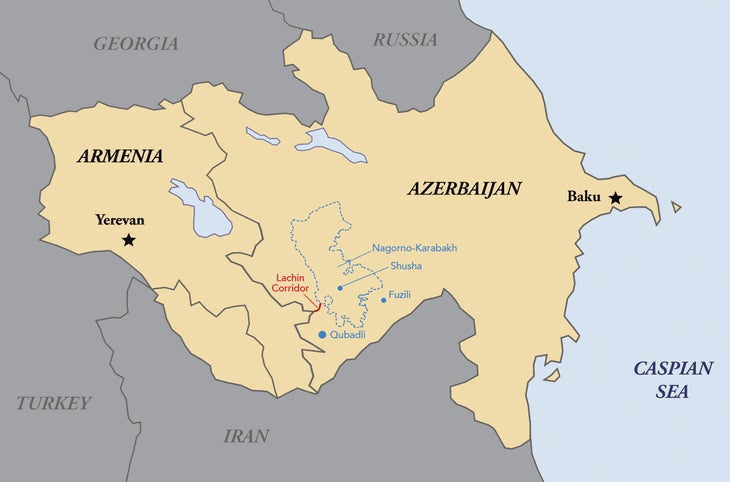Meet the Extreme Travelers Trying to Visit Every Country in the World
I tagged along on a surreal trip to a conflict zone in Azerbaijan with a group of explorers known as the world’s Most Traveled People. No matter that the war there wasn’t over yet.
New perk: Easily find new routes and hidden gems, upcoming running events, and more near you. Your weekly Local Running Newsletter has everything you need to lace up! .
It’s a pleasantly warm afternoon in Azerbaijan, a former soviet republic sandwiched between Russia and Iran, and the tank crewmen of the Qubadli regional Border Detachment are hosting a party. For hours they’ve been working to raise a wedding-style tent and set a dozen tables with cartons of fruit nectar, bowls of nuts, and plates of pale pink meats. The Azerbaijanis have been fighting off and on for more than 30 years with Armenia, another ex-Soviet state a grenade toss to the west, but tonight the war can wait.
Around 5 P.M., 14 shiny Nissan Pathfinders, Toyota Land Cruisers, and Mitsubishi Pajeros come racing into the encampment behind a military-police escort vehicle—a boxy Russian-built Lada—with lights flashing and engine whining. The SUVs file into a gravel parking area that was scratched out of the scrubland. Dozens of the detachment’s T-72 tanks and infantry fighting vehicles sit silently nearby like insects ready to sting.
The dust settles and about 30 civilians from more than 20 countries step from the cars, stretch their legs, and look around in wonder. Some are doctors. Some are vagabonds. All of them are here to see one of the world’s most contentious enclaves.
The detachment base sits on the fringes of Nagorno-Karabakh, a 2,700-square-mile patch of the Lesser Caucasus Mountains nestled inside Azerbaijan but historically home to a lot of ethnic Armenians, too. The two have been at each other’s throats for generations over this region, with thousands of lives lost. In the past four years, Azerbaijan has reclaimed the besieged area, and more than 100,000 Armenians fled back to Armenia. While the conflict appears to be over for now, there are remnants of the war everywhere: step off the road and a land mine might do you in.

A muscular, jovial colonel with thin, graying hair and slate-colored eyes comes forward in his battle dress. The tank crews stand at attention in navy blue boiler suits. His name is Murad, but that’s all he can say. A patch on his chest reads O (I) RH+, which is his blood type.
“Welcome! Welcome!” the colonel says to the guests. “We’re so honored you are here.”
The leader of the visiting guests, Charles Veley, a 58-year-old from Marin County, California, steps forward from a white Mitsubishi that I’ve been riding in, too. “Thank you for having us,” Veley replies. “I hear you have a surprise.”
“Yes, yes,” the colonel says. “I hope you enjoy.”
What’s no surprise is that Veley, who has a boyish grin and a neutral, even way of speaking, is here. That’s because he is, according to a system he created, America’s most traveled person, a wanderer who has visited more of the planet than almost any known human in history. Fewer than ten people have seen more of the globe than he has.
To quantify that, there are lists. The most straightforward one comes from the United Nations, which affirms that there are 195 countries in existence, including places like Palestine and the Holy See. Federal Express says that it delivers to more than 220 countries and territories. The list that Veley compiled, and that thousands of other extreme travelers recognize, tops out at more than 1,500 distinct places that are currently possible for one to visit. It includes countries, regions, enclaves, atolls, both poles, and at least one small, sheer-cliffed islet in the middle of the ocean. Russia isn’t just “Russia,” but 86 discrete stops. The United Kingdom has 30 stops, including islands like Herm and Sark. To see the United States, you must travel to 79 places that stretch from the Florida Keys to the Pribilof Islands in the Bering Sea.
“Charles isn’t an adventure seeker but a knowledge seeker,” his friend Kolja Spöri, the German founder of the Extreme Traveler International Congress, a yearly gathering of the world’s most obsessive travelers that’s been held in such places as Baghdad, Equatorial Guinea, and Siberia, told me. “He’s the spiritual father of all country collectors,” he added in a blog post.












